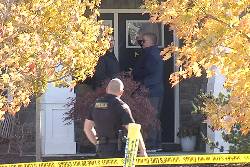An Indiana homeowner accused of killing a house cleaner was charged Monday with voluntary manslaughter in a case that raises questions about the limits of stand-your-ground laws.
Curt Anderson, 62, could face anywhere from 10 to 30 years in prison and a $10,000 fine if he's convicted. He was being held in the Boone County Jail pending an initial court hearing. His attorney, Guy Relford, did not respond to voice messages seeking comment.
Officers found Maria Florinda Rios Perez De Velasquez, 32, dead on the front porch of a home in Whitestown, an Indianapolis suburb, on Nov. 5. Authorities said the Guatemalan immigrant was part of a cleaning crew that had gone to the wrong house just before 7 a.m.
Her husband told media outlets that he was with her on the porch and someone fired through the front door. He didn't realize that she had been shot until she fell back into his arms, bleeding. Authorities determined she had been shot in the head.
Indiana is one of 31 states with a stand-your-ground law that permits homeowners to use deadly force to stop someone they believe is trying to unlawfully enter their dwelling. But police said that there's no evidence the woman entered the home before she was shot.
The case echoes a similar episode in Missouri in 2023 when an 86-year-old man shot Ralph Yarl after the 16-year-old Black teenager came to his door by mistake. Missouri has a similar stand-your-ground law, but prosecutors charged the shooter, Andrew Lester, with first-degree assault and armed criminal action. He ultimately pleaded guilty to second-degree assault and didn’t go to trial.
In New York, which does not have a stand-your-ground law, a man was convicted in 2024 of second-degree murder for fatally shooting a woman inside a car who mistakenly came down the driveway of his rural upstate home.
Boone County Prosecutor Kent Eastwood told reporters at a news conference that the decision to charge Anderson wasn't difficult. Stand-your-ground protections don't apply to Anderson because he lacked enough information to know if his actions were reasonable, Eastwood said.
“It is our belief that the person did not have a reasonable belief that type of force was necessary given all the facts that he had at that time,” Eastwood said.
According to a probable cause statement, Anderson told investigators that he and his wife were asleep in an upstairs bedroom when he heard a “commotion at the door" that grew more intense. He thought someone was using keys, tools, or an instrument on the front door.
He grew frightened, went to the top of the stairwell and saw through the home's windows that two people were outside the front door. He said to himself, “What am I going to do? It's not going away and I have to do something now," according to the statement.
He went into his safe room, got his handgun out of its locked case and loaded it. The commotion at the door grew “more and more aggressive,” he said, and he became terrified that they were going to get inside.
He told his wife to get into the safe room, went back to the stairwell and saw through the windows the people at the front door “thrusting” at the door and getting more aggressive. He then fired one shot toward the door. He said the door never opened and he didn't announce himself or say anything before he pulled the trigger.
He then heard a man crying and weeping and thought he had scared them. He said that he was so scared he didn't initially leave the house when police arrived because he was afraid the would-be intruders were still out there, according to the statement.
Investigators found a bullet hole in the door, but no evidence of any forceful contact with the door itself or the latch and door frame.
The cleaning company that employed the couple confirmed that they were supposed to clean a model home in a nearby subdivision, according to the statement.
Jody Madeira, an Indiana University law professor who specializes in gun rights, said last week that the Rios case was “horrible” and “exceptionally unusual.”
In general, the public can legally access private property — including a front porch — for a legitimate purpose until they are told to leave, Madeira said. For example, a homeowner can’t legally shoot a pizza delivery person or an Amazon driver just for stepping onto their property, she said.
...


 Copyright © 1996 - 2025 CoreComm Internet Services, Inc. All Rights Reserved. | View our
Copyright © 1996 - 2025 CoreComm Internet Services, Inc. All Rights Reserved. | View our